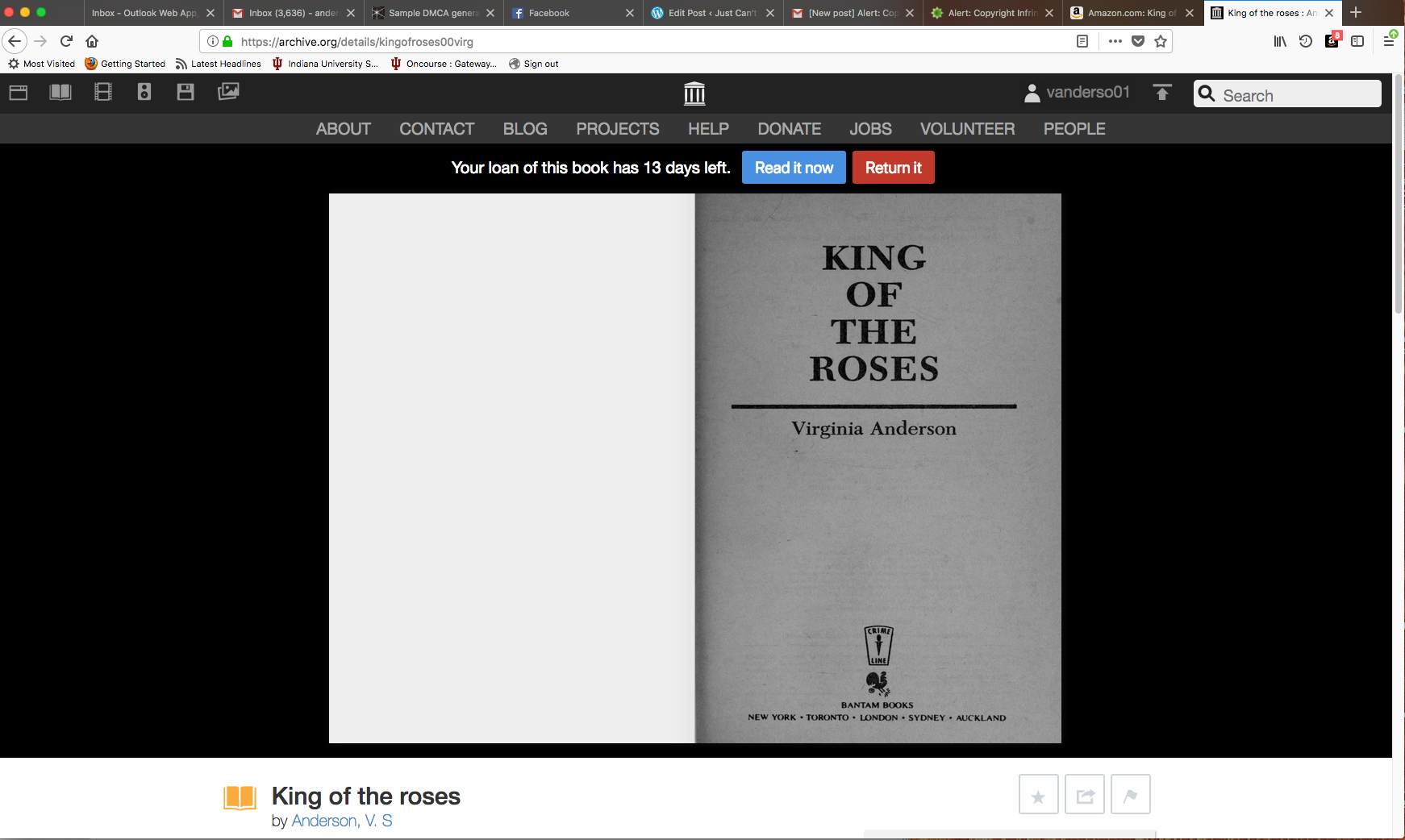
I came across this post via Chris the Story Reading Ape (a crucial source for publishing tips and news). Steven Spatz, president of BookBaby.com, a book packager for independent publishers, lays out “Six Myths (and a Few Facts) about Traditional Publishing.”
Just to be clear, “traditional publishing” means having your book produced by an established, for-profit publishing company that will pay you an advance, provide you with an editor and a publicity department, physically manufacture your book—including the cover and format—and, ideally, get it to sell.
In contrast, independent or self-publishing means writing a book and getting it edited, producing a formatted copy with a cover, uploading it as an ebook to an ebook vendor like Amazon or Smashwords or as a “real” book like a paperback or hardcover to a company that “packages” it for you and that may supply some editing, cover production, and marketing, depending on what you pay for.
Whew.
When I contemplated this post, I didn’t know those definitions could be so hard.
Bottom line: A traditional publisher PAYS YOU and does it all (or much of it) for you. As an indie publisher, you either do it all yourself, possibly for free, or pay for certain services you don’t feel you can do well.

With that out of the way, the very first comment on Mr. Spatz’s article pointed out that BookBaby specialized in packaging books for “indie publishing,” and is therefore biased against traditional publishing.
Okay, Spatz may be biased. But as I read, I found myself saying, yeah, yeah, that’s exactly what I found out during my all-too-brief existence as a traditionally published author. Spatz’s observations, in my view, offer a useful “wait-a-minute!” that prospective authors need before they decide how they want to enter the publishing melee.
Note that the experiences I cite here are grounded in my own career: I was traditionally published by three MAJOR houses, St. Martin’s, Bantam/Doubleday, and New American Library. Today’s traditional publishing field is surely more competitive, not less, than in those glory days.
So, with eternal gratitude to Victoria Strauss, read these thoughts as a version of Writer Beware.
Spatz’s Myth 4: Publishing with a Traditional Publisher means your book will show up on bookstore shelves.
This was my first devastating revelation. And my mother’s. We’d walk into a bookstore and she’d gesture at the extravagant front-door displays and demand, “Why don’t they put your books out here?”
Because, I learned, shelf space is a precious, much fought-over commodity. In order to be provided so much as a sliver of space the width of a spine, my books had to have a mega advertising budget behind them. Mega. I had to be Paris Hilton. Or Michelle Obama. Or . . . you know who I mean.
My mass-market paperbacks (these still do exist) did get rack space in drugstores. For about a month.
I can now get my books into independent bookstores by carrying them there and asking for shelf space while presenting a reason why I deserve it. This was as true before indie publishing as it is now. Only it never occurred to me. I didn’t know that was part of my job.
Myth 3: A traditional publisher will market your book.
This hope meant almost zilch thirty-five years ago. I can’t imagine it means more now.
No one told me that I really needed to get out there and market. They told me, write the next book. At least now they’re honest about this.
Marketing is the hardest thing asked of authors who really would rather be writing the next book (well, hardest after writing the synopsis). Only some of us have marketing in our blood. I found that my houses had standard “marketing” practices that gave the books a chance to take off but didn’t do anything out of the way to grow them wings. A smart author (I was not) would have noticed all the other things that could have been done, and would have done them.
I did do something. For King of the Roses, they asked me for a list of horse-racing celebrities who would endorse the book. I compiled such a list. They wanted to know who on that list I knew whom I could personally ask. Um, no one.
I said, since this book is about the Kentucky Derby, why not run an ad in the Daily Racing Form on Derby Day? Not cost-effective, they said. So I paid for it. Myself. They may have been right. In those days, you couldn’t track clicks to see who responded to what ad.
What a traditional house can do is send your book out to reviewers. They have lists of people who will possibly read your book and write it up in a highly visible place. Much more effective than begging for reader reviews. If the right reviewer—say, at the New York Times—takes a shine to your cover or back-of-book copy, you might really end up on Oprah! (No way of knowing what my brief mention in the prestigious Atlantic Monthly meant to my sales.)

Myth 5: Getting picked up by a major house means your writing career is set.
No.
Your career with a traditional publisher will last only as long as you write a) what the publisher thinks will sell; or b) what actually does sell. You want a career in a traditional house, YOU better make sure what you write sells. See Myth 3.
And if what you wrote the first time around doesn’t sell well above average, second chances are hard to come by. More than once agents I’ve approached want sales figures from my previous books. At the very least, they want my platform. How many famous people do I know who will endorse my book?
It takes only one “disappointing” book to end this kind of career. I know.
That doesn’t mean there aren’t ways back into the fold. But they are at least as hard as that first foray, when you stood a chance of being a “discovery” that sent the sales team into raptures. I was there. I know.
Some “truths” from Spatz I can endorse:
**It will take at least a year and probably longer for your traditionally published book to make it into print.
**You have to fight for control over your metadata and cover. If you don’t like cover or the back-cover copy or the book description, you have to assert yourself. I was able to protest the inner jacket flap copy for one of my books and rewrite it. But it was when I saw the back-cover copy of that book that I knew the book was doomed. No blurbs quoting the excellent reviews for my first two books, both in paperback from Bantam. Instead, just an excerpt from the book.
Decent writing, I guess, albeit arguably overwritten. Of course, in Bantam’s defense, in those days, no one could order a mass-market paperback once it was out of print.
**And if your traditionally published book does make it onto bookstore shelves, it will run out its welcome fast. Once it’s last month’s sensation, it’s gone. Maybe you’ll get a paperback deal that may hang onto shelf space in row 6 a little longer. But it if doesn’t sell, bookstores will pull it for this month’s New Thing. People will buy your book from Half-Priced Books or from third-party sellers on Amazon, and you won’t make a cent.

A truth of my own: Working with a top editor at a major house doesn’t mean your book will get better.
My editor at St. Martin’s was superb, my editor at Bantam horrible, and my editor at NAL nice but not inspirational. (They are all long gone, so don’t ask.) I learned that, in the end, I alone was responsible for the words that got published under my name.
I regularly depressed people at writing conferences by sharing these experiences.
If I’ve depressed you, at least you are forewarned.
If this sounds as if I am biased in favor of self-publishing, well, to a certain extent yes. I would like to be traditionally published again because a “published” book, however doomed in the market, would give me credentials for speaking and guest-posting. I would also like reviews. And my feeble, newbie marketing efforts are unlikely to earn me what I would make from even the most anemic advance.
What I do like about self-publishing is that my prospects are limited only by my energy and creativity. There is no shelf-life for my books. I can try new marketing techniques indefinitely without knowing that next week, or the week after, my books will show up on that pile labeled “remaindered.” I can even revise and republish. I can be a completely new author, in a completely new genre, as fast as I can write.

My final words of “wait-a-minute”:
If you want to submit traditionally, haul out all those grammar books and all those tomes on how to structure a story. Editors and agents do gatekeep based on how much work you’re going to mean for them versus how much you can earn for them. A badly edited, unstructured book means more work for them. A great idea can die because it looks as if it will take too much time to slap into shape. Make their job as easy as you can.
If you want to self-publish, do your due diligence. Book packagers (that includes Kindle Direct Print and Ingram as well as BookBaby, Lulu, etc.) vary widely in quality and cost. Make sure you understand how the self-publishing universe works (it’s all out there online) and don’t pay for anything you can do yourself. You can publish your ebook in an hour at Smashwords or Amazon for free. Your paperback may take a little longer, but you can do it. Don’t pay for anything you can do yourself.
Ask me anything you want about my days as a “published author.” I’ll tell you everything but the names.











 Check out my
Check out my 




